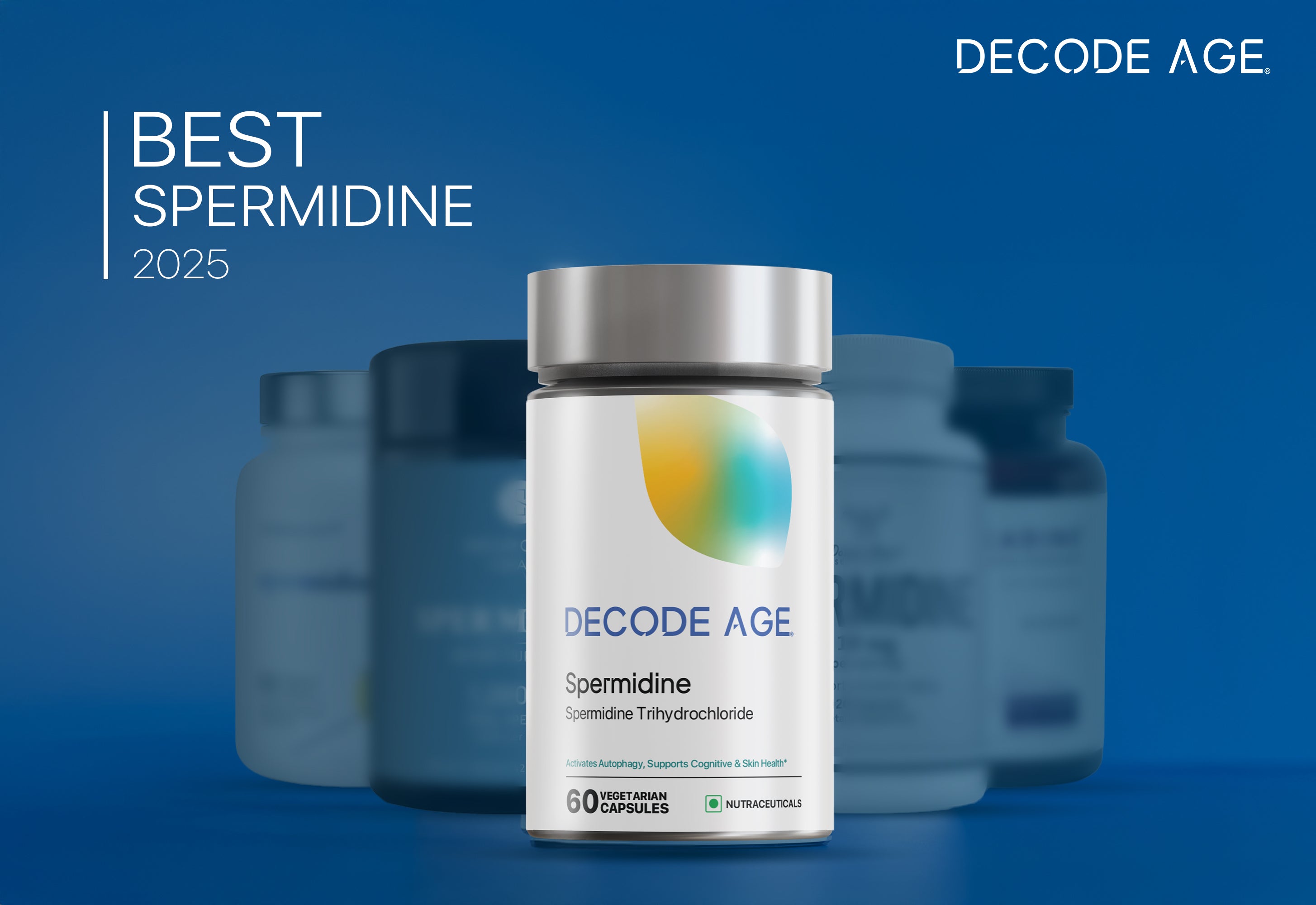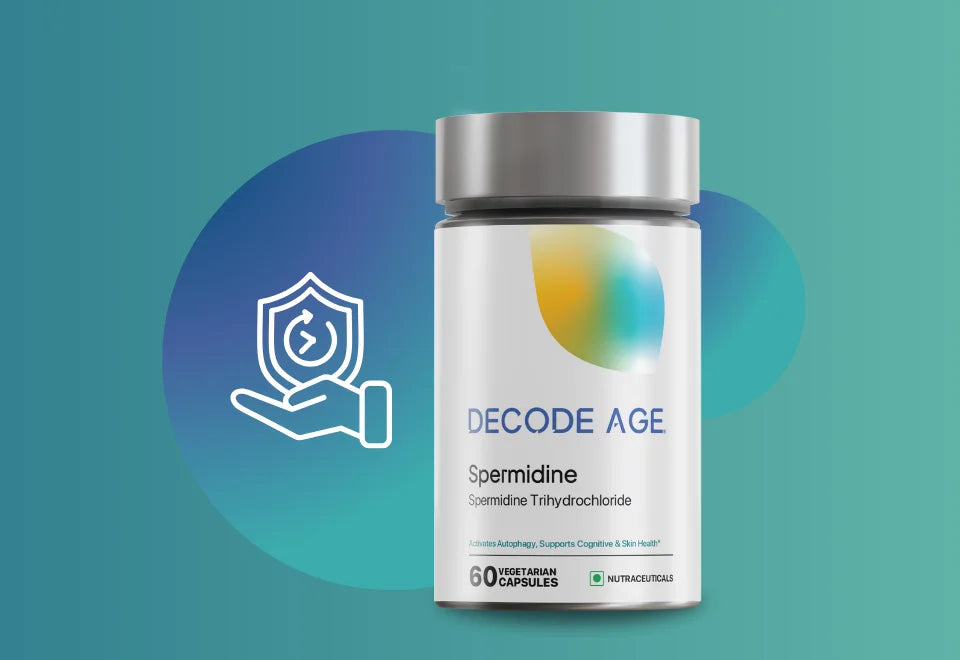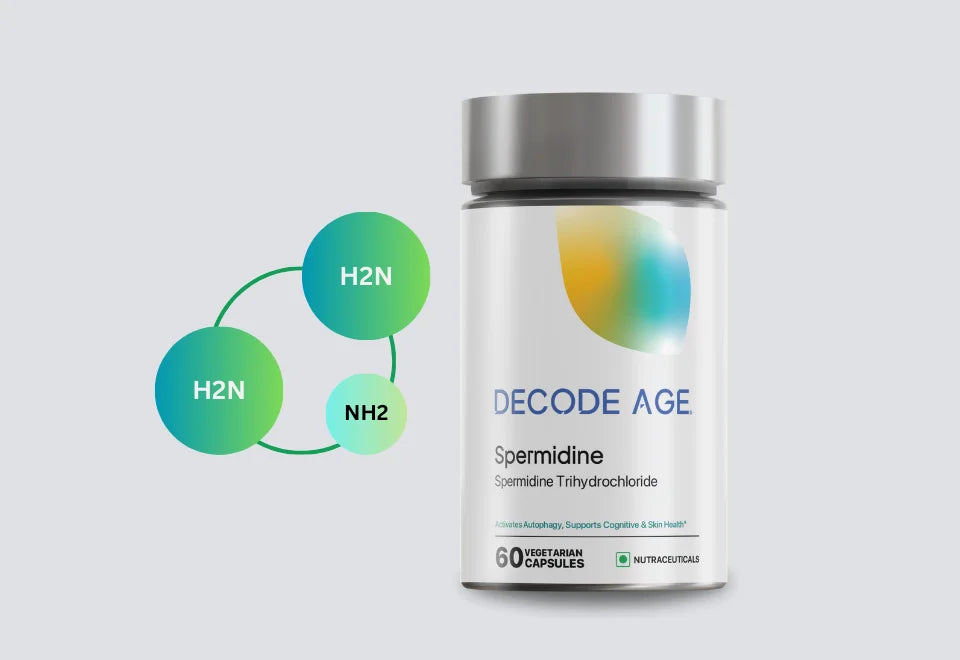Ageing is not just about wrinkles and grey hair, it’s also about what happens inside our cells. One critical molecule that quietly declines as we grow older is spermidine, a natural polyamine that supports autophagy, cellular growth, and longevity. Researchers have found that maintaining higher spermidine levels is linked to healthier ageing, but unfortunately, its levels steadily fall with time.
So, why does this decline happen? And what does it mean for our health? Let’s find out in this blog.
The Role of Spermidine in Our Body
Spermidine is found in nearly every living cell. It plays a vital role in:
- Autophagy activation – the cellular “recycling” process that clears out damaged proteins and organelles.
- DNA stability – spermidine binds to DNA and protects it from oxidative stress.
- Mitochondrial function – helps maintain energy production inside cells.
- Inflammation control – linked with reduced chronic inflammation in ageing tissues.
Dr. Frank Madeo, one of the leading spermidine researchers, once said:
“Spermidine is one of the most promising natural compounds for healthy ageing because it targets autophagy, the very process that declines with age.”
Why Spermidine Levels Decline with Age
Reduced Internal Production
Our body can make spermidine on its own. But as we age, the enzymes responsible for polyamine synthesis, such as ornithine decarboxylase become less active. This directly lowers the natural supply of spermidine.
Lower Dietary Intake and Absorption
Various foods are naturally rich in spermidine. Some of the spermidine rich foods include wheat germ, soybeans, aged cheese, and mushrooms. Yet, older adults often eat less fiber and polyamine-rich foods, while their digestive efficiency also tends to decline. Both these factors ultimately contribute to reduced dietary spermidine availability.
Increased Cellular Demand
Ageing cells face more oxidative stress, DNA damage, and misfolded proteins. Since spermidine supports autophagy, more of it gets used up to maintain balance, leaving lower circulating levels of spermidine.
Oxidative Stress and Depletion
With age, reactive oxygen species (ROS) increase. Spermidine has antioxidant properties, but fighting oxidative stress consumes spermidine reserves more rapidly, hence, lowering spermidine levels.
Decline in Gut-Derived Spermidine
The gut microbiota also produces spermidine, but with age the microbial diversity reduces. This leads to less endogenous spermidine being supplied from the gut ecosystem.
Health Implications of Low Spermidine
The decline in spermidine isn’t just a number on a lab test; it translates into very real effects on how our bodies age. Because spermidine plays a central role in cellular maintenance, its reduction impacts multiple systems.
Reduced Autophagy and Protein Build-Up
One of spermidine’s best-studied roles is activating autophagy, the process where cells recycle damaged proteins and organelles. When spermidine levels fall, autophagy slows, and “cellular clutter” builds up. This accumulation is strongly linked with neurodegenerative diseases like Alzheimer’s and Parkinson’s [1].
Accelerated Cellular Ageing
Spermidine interacts with DNA and histones, helping preserve genetic stability. Lower levels of spermidine means that the DNA is more vulnerable to oxidative damage and breaks. Over time, this accelerates cellular senescence, cells enter a “zombie-like” state where they no longer function optimally but still drive inflammation [2].
Decline in Cognitive Performance
Recent clinical research has connected spermidine supplementation with better memory performance in older adults. In contrast, lower spermidine levels are correlated with age-related memory loss and reduced learning capacity. Essentially, less spermidine means the brain is less able to clean itself and function efficiently [3] [4].
Weakened Immune System
The immune system relies on polyamine (spermidine) to regulate T-cell activity. When spermidine levels decline, T-cells don’t multiply or function as effectively, leaving the body less capable of fighting infections. This partially explains why older adults often have weaker responses to vaccines and greater vulnerability to illnesses [5].
Cardiovascular Ageing
Spermidine also supports healthy blood vessel elasticity and heart function. A landmark study found that higher spermidine intake was associated with lower blood pressure and reduced cardiovascular risk. With reduced spermidine, arteries stiffen faster, raising the risk of heart disease [6].
“The decline of spermidine parallels the decline of cellular resilience, making it a key biomarker for healthy ageing.”— Dr. Guido Kroemer, Professor of Immunology, Université Paris Descartes

Can We Restore Spermidine Levels?
The good news is that while natural spermidine drops with age, research suggests there are ways to support and restore it.
Dietary Sources
A natural way to support spermidine is by eating foods rich in it. Wheat germ is one of the most concentrated sources, but mushrooms, soy products, green peas, legumes, and aged cheese are also excellent options. Populations with naturally higher dietary spermidine intake, such as in parts of Japan and Italy, have been observed to live longer and healthier lives.
By Supporting Gut Microbiome
The gut microbiome produces a significant share of spermidine. Unfortunately, gut diversity shrinks with age, leading to lower output. Supporting gut health with the right nutrients, prebiotics, and a fiber-rich diet can help the body produce more spermidine internally. Fermented foods like miso, sauerkraut, and kefir may also encourage spermidine-producing bacteria.
Spermidine Supplements
For many people, supplements offer the most reliable way to restore youthful spermidine levels. Several clinical trials have shown that spermidine capsules improve memory and cardiovascular markers in older adults. Decode Age’s spermidine supplements, for example, are standardised for purity and bioavailability, ensuring consistent benefits that food sources alone may not provide.
Lifestyle Practices that Complement Spermidine
Interestingly, some lifestyle interventions mimic spermidine’s effects. Caloric restriction and intermittent fasting both boost autophagy. Exercise improves mitochondrial function and cellular resilience. When combined with spermidine supplementation, these practices may create a synergistic effect, slowing cellular ageing more effectively than any single intervention.
Note:
Long-Term Perspective: It’s important to remember that spermidine isn’t a “quick fix” supplement, it works gradually by supporting fundamental cellular processes. The benefits often show up as better energy, sharper memory, improved cardiovascular health, and resilience against age-related decline.
Conclusion
The gradual decline of spermidine with age isn’t random. While diet and lifestyle can help slow this decline, they often aren’t enough to fully restore spermidine levels, especially when age has already reduced how efficiently our bodies can absorb and produce it. This is why researchers are paying close attention to spermidine supplementation as a reliable way to bridge the gap.
Decode Age’s Spermidine supplement is designed to meet this need with purity, safety, and science at its core. By delivering spermidine in a bioavailable form, it supports autophagy, cellular renewal, and overall vitality, helping you take control of the very processes that ageing tends to slow down.
FAQs
At what age do spermidine levels start to decline?
Spermidine levels start dropping noticeably from middle age, around the 40s and 50s. However, the rate of decline varies between individuals depending on diet, genetics, and gut health. Lifestyle choices such as poor diet, stress, and lack of exercise may speed up this decline.
Is spermidine supplementation safe for older adults?
Clinical trials suggest spermidine supplementation is safe and well tolerated, even in elderly populations. Reported benefits include improved cognitive function and cardiovascular support. However, long-term safety studies are ongoing, and consulting a healthcare provider before starting supplementation is recommended.
How does spermidine support brain health?
Spermidine stimulates autophagy in brain cells, helping clear out toxic proteins linked to memory decline and dementia. Research has shown that older adults taking spermidine had improved memory performance, making it a promising tool in supporting cognitive health during ageing.


























Leave a comment
All comments are moderated before being published.
This site is protected by hCaptcha and the hCaptcha Privacy Policy and Terms of Service apply.